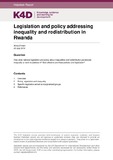| dc.contributor.author | Orrnert, Anna | |
| dc.coverage.spatial | Rwanda | en |
| dc.date.accessioned | 2018-12-17T15:56:44Z | |
| dc.date.available | 2018-12-17T15:56:44Z | |
| dc.date.issued | 2018-07-20 | |
| dc.identifier.citation | Orrnert, A. (2018). Legislation and policy addressing inequality and redistribution in Rwanda. K4D Helpdesk Report 358. Brighton, UK: Institute of Development Studies | en |
| dc.identifier.uri | https://opendocs.ids.ac.uk/opendocs/handle/20.500.12413/14188 | |
| dc.description.abstract | This report is one of three related K4D helpdesk reports on inequality in Rwanda. The other two examine links between poverty, inequality and exclusion (Carter 2018) and provide data on inequalities (Orrnert 2018). This review summarises key national policies and legislation related to inequality and redistribution2 in Rwanda. Where available, this review provides insights into how these policies perpetuate inequality or work to address it, as well as how effective they are. Undertaken in six days, this review draws largely on policy documents from the Government of Rwanda, and academic studies, as well as some reports by international donors. A comprehensive review of all the relevant policies and legislation is beyond the scope of this study. Thus, the review focuses on key policies and legislation in specific sectors (economic empowerment and agriculture; health; education; housing and infrastructure) as well as policies and legislation targeted at particular groups (the poorest, women and girls, youth and other marginalised groups). The key findings include: there is a lack of systematic evaluation of many Rwandan government policies, including those aimed at tackling extreme poverty and inequality;
Evidence suggests that there exists a tension between the government’s competing policy goals of achieving economic growth and decreasing inequality. In some cases (notably agricultural policies), the government prioritises its economic growth objectives, which can have a negative impact on vulnerable segments of the population; and despite efforts to combat inequality on the policy-level, several groups remain significantly disadvantaged, including the poorest, women, persons with disabilities and historically marginalised people (HMP). Furthermore, the study also identified the gaps in policy assessments based on non-standard measures (such as food insecurity and land tenure) that may illuminate relevant insights about experienced inequalities in rural and agricultural communities and the impact of policies on these. It also highlighted the limitation on the evidence of policy impacts on vulnerable communities, including youth, persons with disabilities and HMP and thus, there is a need for data that provides insights into the challenges that interlocking inequalities present to policy-makers working to dismantle inequality. | en |
| dc.language.iso | en | en |
| dc.publisher | IDS | en |
| dc.relation.ispartofseries | K4D Helpdesk Report;358 | |
| dc.rights.uri | https://www.nationalarchives.gov.uk/doc/open-government-licence/version/3/ | en |
| dc.subject | Economic Development | en |
| dc.subject | Education | en |
| dc.subject | Gender | en |
| dc.subject | Health | en |
| dc.subject | Millennium Development Goals | en |
| dc.subject | Participation | en |
| dc.subject | Population | en |
| dc.subject | Poverty | en |
| dc.subject | Rights | en |
| dc.subject | Rural Development | en |
| dc.subject | Social Protection | en |
| dc.subject | Work and Labour | en |
| dc.title | Legislation and Policy Addressing Inequality and Redistribution in Rwanda | en |
| dc.type | Other | en |
| dc.rights.holder | © DFID - Crown copyright 2018. | |
| dcterms.dateAccepted | 2018-07-20 | |
| rioxxterms.funder | Department for International Development, UK Government | en |
| rioxxterms.identifier.project | K4D | en |
| rioxxterms.version | VoR | en |
| rioxxterms.funder.project | 238a9fa4-fe4a-4380-996b-995f33607ba0 | en |

